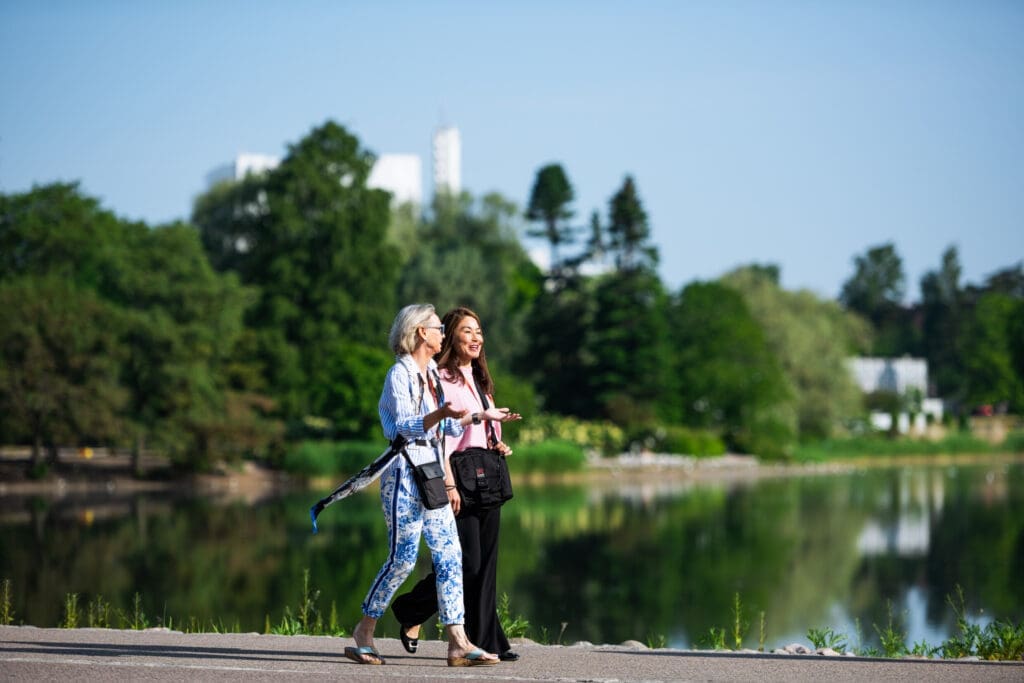Breaking barriers: A global perspective from female VCs in Finland, Japan, and the UK
We asked three female venture capitalists from Finland, Japan, and the UK about their experiences in the male-dominated VC world and what needs to change in the VC landscape.

12 min read
Want to invest in Helsinki?
Our business advisor Tian Yu can help.
Gender diversity in venture capital
While there’s been progress in venture capital (VC) gender diversity over the years, there’s still much work ahead. Many people are helping to turn the tide, empowering more women to become founders and investors.
We set out to explore the differences and similarities three women in VC face, uncovering their motivations, challenges, and what advice they’d give to other female investors and founders:
- Mari Luukkainen, Principal at Icebreaker.vc in Finland
- Michiko Kato, Partner at Woven Capital in Japan
- Caroline Hughes, founder of Womankind Ventures in the UK
In this article, we shed light on the underrepresented voices in venture capital and showcase the importance of diversity, equity, inclusion, and belonging (DEIB) in the VC landscape.
Navigating Finland’s startup and VC ecosystem
Finland is known for being progressive in terms of gender equality: the country was ranked third in the 2023 World Economic Forum (WEF) Global Gender Gap Report, and as the second-best country in the world to be a woman by the 2021/2022 Women, Peace, and,
Security Index.
However, when it comes to the private equity and venture capital (PE & VC) space, Finland’s track record on DEI issues has been less than impressive.
Failing to prioritise DEI issues in VC will limit Finland’s growth potential, especially considering the country’s population structure and the impending shortage of skilled workers. Finland needs to prioritise not just gender diversity, but also racial and ethnic diversity to attract international talent and remain competitive.
More diversity equals better business with mixed management teams generating six times more revenue. And studies have shown that diverse teams are more innovative, better at problem-solving, more motivated, and more resilient to take risks.
Mari Luukkainen is a trailblazer in the Finnish VC landscape, helping to increase diversity in the space. After growing a Nordic home cleaning startup’s revenue from under a million to 13 million in just two years, Mari started her career in VC to continue helping companies multiply their impact of growth.
When Mari joined Icebreaker.vc in 2019, there were few women in this space, but she’s seen fast development in the past years: “The diversity of VCs is developing faster than founding teams. At Icebreaker, we focus on Finland, Sweden, and Estonia, and it’s the same issue everywhere: women are not part of the founding teams.”
So, why aren’t more women founding companies?
VCs need to look beyond founders’ technical backgrounds
While many founders in the UK and US come from non-technical backgrounds, lacking a technical background in Finland can be an obstacle.
You’ll have the biggest growth if you can back people of all genders who have a commercial mindset and who can also lead tech companies.
Caroline Hughes, 90-Day Finn 2023
Caroline Hughes—a 90-Day Finn participant, startup founder, and investor—shares her view on the Finnish startup ecosystem: “Many Finnish startups are very technical and the founders come from STEM backgrounds. That tends to push the pipeline issue even earlier: fewer women entrepreneurs are starting companies that go on to get investments because fewer girls and young women do STEM in university.
“But you don’t have to be a technical founder to build a tech business. What needs to change is the mindset at the investor level that you should be mainly backing people with technical backgrounds. You’ll have the biggest growth if you can back people of all genders who have a commercial mindset and who can also lead tech companies.”
Mari echoes the need for more women without technical backgrounds to join tech startups: “People who don’t have a technical background are extremely beneficial because the core issue for many Finnish startups is the lack of branding, marketing, and communication skills. This is usually because the founders are (male) engineers who can’t speak about the benefits of their product to non-technical people—and they forget that includes investors.”
Women need to understand their relevance in tech
By questioning their relevance in tech, many women miss the opportunity to build a career in the industry or be part of a founding team.
This is a systemic issue, stemming from stereotypes, biased education, and discrimination, which Mari experienced first-hand in her childhood. To help fix the diversity issue, Mari advises women to step up and join tech teams—even if it’s outside their comfort zone. “A lot of women are overanalysing it, thinking: Am I relevant in tech? Am I good enough? But you can never find out if you don’t even try. And if you don’t do it, then some guy is gonna do it, anyway.”
While Mari’s comfortable in the tech space, she didn’t initially see herself as relevant in VC—it took a male partner at Icebreaker to ask her if she’d considered joining the investment team. Now, Mari encourages other VC male partners to do the same: “Don’t wait for women to realise they’re relevant for a role but ask if they’ve considered it. Be proactive in finding women VC talent, then help them climb higher. Help them see the opportunities available for them that they’re unable to see themselves.”
Mari also steps outside her comfort zone to represent minorities in the VC space. “I’m an introverted Finn, but I think it’s important for me to show up as a person from a small town with a non-university background, non-financial studies background, and as a woman part of the LGBTQ community to be a role model and try to help others.
“How can I sit at home and wait for the industry to change if I don’t take a proactive part myself and change it from the inside?”
To further diversify the tech industry, Mari also founded Herizon: a non-profit organisation providing free growth hacking training, mentorship, and job opportunities for international talent. At Herizon, they’ve trained and employed over 200 immigrant women, and have a pipeline of over 1,000 highly educated immigrant women in Finland—the majority of which never previously thought about joining a tech company.
Don’t wait for women to realise they’re relevant for a role but ask if they’ve considered it. Be proactive in finding women VC talent, then help them climb higher. Help them see the opportunities available for them that they’re unable to see themselves.
Mari Luukkainen, Principal, Icebreaker.vc
Herizon Academy graduates often quickly advance in their careers, reaching roles where they influence hiring decisions and directly impact the company’s diversity.
Carving space as a minority in the Japanese VC “boys’ club”
Compared to Finland’s smaller market, the Japanese domestic market is so large that startups don’t need to scale outside the country immediately. This means the Japanese startup ecosystem is highly networked and mainly a “boys’ club,” making it harder for women to break in.
Japan has been notorious for gender disparities across industries: the country ranked 125th in the WEF Global Gender Gap report—the lowest among G7 countries and in the East Asia and Pacific region. And according to a report by the Japan Venture Capital Association (JVCA), only 9% of management and investment decision-makers are women.
Michiko Kato is one of the few women at the top of Japan’s male-dominated business world. She’s a partner at Woven Capital, a dedicated $800 million growth fund backed by Toyota that invests in global ventures transforming the mobility experience.
Her current role brings together her experiences as an investor and operator. Previously, Michiko was Chief Financial Officer at AI startup ABEJA, an investor at Morgan Stanley, and at private equity firm Unison Capital. She studied both in Japan and the US, having earned her MBA from Harvard Business School.
While navigating her career as a minority poses challenges, Michiko emphasises the importance of women in VC: “Investing is about making a bet on something that really matters in the future. Having women in VC—especially in decision-making roles—is important because VC has a lot of power. If VCs don’t have the right mindset or values that reflect our society as a whole, they can invest in the wrong startups that don’t represent diverse points of view.”
Embrace being different
To advance in her career, Michiko had to embrace being different in a culture where the expectation is to be like everyone else.
“Being the only woman wasn’t an easy situation. I found myself separate from the boys’ club and the strong drinking culture, and at the beginning of my career, I felt inferior for being different. But at some point, I realised I should stop caring. I’m different—so what? I gave up trying to assimilate with the majority in the Japanese banking system and stopped comparing myself to my peers. That mentality helped me keep pushing to try new things in my career.”
I hope women who want to help change the VC and startup ecosystems can join the industry now to help each other.
Michiko Kato, Partner, Woven Capital
Being different also comes with some advantages. For example, clients remembered Michiko because women in the industry are rare. And with a different perspective, women can catch trends and discover services that male investors haven’t previously considered.
Michiko shares advice for other women interested in VC: “Embracing our uniqueness and having the courage to make a difference is important. I hope women who want to help change the VC and startup ecosystems can join the industry now to help each other.”
Find a community for support—and give back
Networking in the male-dominated VC space is a challenge, but some women are working to change the status quo. Tokyo Women in VC is one place where Michiko gets encouraged by like-minded people.
Michiko is also one of the few Japanese women of her generation building her career as a mother. “I have an 8-year-old son and a 1-year-old son, and in the generation above me, I didn’t have a lot of female role models balancing everything: the only senior women sacrificed everything for work. Now, our generation is changing—people are starting to balance both life and work.
We need to learn from today’s women about our values, our ways of thinking, and how to cope with stress.
Michiko Kato, Partner, Woven Capital
“Managing both my professional workload and child care is extremely challenging: I am constantly at full capacity from early in the morning to late at night, but I really enjoy being stretched and I never get bored of what I do.”
Like many women balancing work and childcare, Michiko often struggles with feelings of inadequacy, asking herself: “Am I giving enough attention to my children? Am I being a good mom?”
When those feelings come up, Michiko leans on her friends going through similar situations to keep up her motivation and self-esteem. “We often share our struggles and exchange tips. I’m encouraged by like-minded working moms to feel like I’m not alone.
“It’s all about having a community. We can’t learn so much from the past since social expectations were so different, so we need to learn from today’s women about our values, our ways of thinking, and how to cope with stress.”
To encourage other women to step into leadership positions, Michiko also serves as a board member of a startup and shares her experiences with others. “I want to help women think: “Maybe I can do it. I’m not perfect, but that’s alright. My problems are similar to hers, but she’s still doing it.”
Beating the statistics as a woman founder and investor in the UK
While the UK has a thriving startup scene, women are underrepresented in venture-backed founding teams and investors. Women make up 51% of the population, but not 51% of entrepreneurs or investors: only 17% of business owners are women, and only 13% of senior people on UK VC investment teams are women.
Statistically speaking, it’s extremely challenging for female founders to get venture capital investment for their business: Companies founded solely by women get less than 3% of all VC funding.
However, entrepreneurs like Caroline Hughes have beat these statistics and are helping others do the same.
Caroline is the founder of consumer fintech startup Lifetise, plus co-founder of women-led global startup accelerator Hive Founders and its sister angel investment group Womankind Ventures.
Caroline shares: “Women entrepreneurs are the fastest growing group within entrepreneurship overall, but they’re blocked at the scale of their ambition and the impact they could have because they can’t get enough capital to grow.
“There’s a real sense of injustice around this, and it doesn’t make sense from an overall business perspective: the biggest returns over the next 30 years will come from untapped areas rather than selling to the same homogenous market that’s always been sold to.”
Teaching female founders how to raise funds
Caroline experienced the frustration of raising capital as a woman founder firsthand when building her startup. But she also got plenty of support along the way, including from Hive Founders.
I want to see more women with ambition and drive building high-growth businesses. We build differently and structure our companies differently, but we also build to solve different solutions than those already tackled so far.
Caroline Hughes, Womankind Ventures
She joined Hive to give back to other founders, teaching them the playbook on how to raise investment as a woman entrepreneur. This past year, Hive trained 60 founders who have already raised millions in investments.
“There are three women founders behind Hive who have all been able to beat statistics to successfully raise investment, and now we feel it’s our mission to help teach the next wave of founders coming behind us how to do it.”
While fundraising is a hard process for anyone, it’s especially hard for women because they need to have more traction in their business. “We’re not backed on potential, but on proof of what we already have. We have to be further ahead in our businesses to get a shot at funding. If you know that—even if the expectations are unfair—then you’re better equipped for the process,” Caroline explains.
Caroline is also a mentor for the Tech Nordic Advocates‘ Nordic Female Tech Founder Frontrunner Growth Program. She echoes Mari’s advice for more women to get involved in the startup scene, and Michiko’s tip to embrace being different: “I want to see more women with ambition and drive building high-growth businesses. We build differently and structure our companies differently, but we also build to solve different solutions than those already tackled so far.”
Change is needed from both the startup and investor sides to improve gender diversity
As is the case around the globe, the biggest challenge in the British VC landscape is that not enough people are investing in women-led businesses.
“It’s not enough for us to just create more investable businesses through the Hive accelerator program because then all we’re doing is creating a lot more frustrated female founders who’ve all got incredible businesses but are still lacking capital. We also have to change the investor landscape.”
Caroline contributes to this in two ways:
- At Hive: Becoming a trusted source of dealflow for VCs by making sure they see the pipeline of incredible women-led businesses coming through the accelerator program.
- At Womankind Ventures: Getting more women and non-binary people (and allies) comfortable becoming angel investors.
While the VC space is becoming more diverse, not enough women hold senior, decision-making positions. Caroline shares: “We need to see more women and minority ethnic people who are general partners within VC firms who are actually able to find and sponsor companies, and then make those investment decisions.
VCs are human beings, so they tend to invest in solving problems they can imagine themselves. Likewise, when founders are scanning VC firms’ websites, they want to approach someone who looks like them.
“When I talk to VC firms that have an all-male team, they refer to lack of diversity as a pipeline issue: they’re simply not seeing enough female or minority-ethnic founders in front of them. But it wouldn’t be a pipeline issue if they had female and minority ethnic founders on their team,” she continues.
The responsibility to support women-led startups shouldn’t rest solely on female VCs’ shoulders: male allies are also needed, as HBR research shows that it’s a lot easier for female founders to grow their startups if they raise at least some capital from men from the start.
Unique challenges and common threads for women VCs
The different ecosystems in Finland, Japan, and the UK create unique challenges for female VCs and founders. In the UK and Japan, for example, it’s harder for founders to access venture capital if they’re not well-networked.
In Finland, government-backed funding through organisations like Business Finland makes things more equal for founders in the early stages. You don’t have to be wealthy or already know angel investors to get a shot at starting
Caroline Hughes, 90-Day Finn 2023
Caroline explains: “In Finland, government-backed funding through organisations like Business Finland makes things more equal for founders in the early stages. You don’t have to be wealthy or already know angel investors to get a shot at starting, whereas in the UK if you’re a minority founder and you don’t already have relationships, it’s much harder.”
Coming from the UK, Caroline sees the Finnish ecosystem as much more collaborative and open. VCs are closer and more accessible to startups, with communities like Maria 01 bringing startups and VCs under the same roof. The benefits of the Finnish ecosystem also include better work-life balance.
But this environment can also create a type of cocoon: a safe environment where startups aren’t pushed to grow.
“The big challenge here is helping Finnish startups be more ambitious. Finland is like the world’s R&D lab: they’re building world-beating technology around climate, life sciences, and deep tech. Finnish companies need global capital to help them expand globally—if incredible tech gets stuck in Finland and never reaches its potential, that’s a problem for the world, not just VCs,” says Caroline.
Finland is like the world’s R&D lab: they’re building world-beating technology around climate, life sciences, and deep tech. Finnish companies need global capital to help them expand globally—if incredible tech gets stuck in Finland and never reaches its potential, that’s a problem for the world, not just VCs
Caroline Hughes, 90-Day Finn 2023
Japan faces similar challenges: in a risk-averse culture, it’s hard for startups to expand their businesses outside of the country. Finnish and Japanese founders and VCs might gain insights from the UK’s approach to growth trajectory:
- In the early stages, startups can ask themselves: Where am I going to be competing? What does that mean for my business? Where do I have to get my business so that it can be genuinely competitive?
- VCs can build more relationships with global investors so that when pre-seed and seed-stage companies get to the later stages, they have a network of VC firms in the markets where those companies want to grow—it becomes more of a networked effect.
Top tips from Mari, Michiko, and Caroline: We need more women VCs in decision-making roles. That’s where we’ll start to see real change. Women need to step up to help change the industry. The more women starting businesses, the harder it will be for VC firms to ignore them. Your differences are a superpower. Thanks to your unique perspectives and experiences, you can help solve the right problems and choose the right investments. Community is key. You can’t build and grow in isolation. Let’s work together to make things better for all of us rather than work in isolation to make it better for us individually.
Paving the way for diversity in VC
Mari, Michiko, and Caroline’s experiences highlight the importance of diverse voices in VC. We not only need more female startup founders but also more female VCs with decision-making power to drive the startup ecosystem forward.
Their stories underscore a simple truth: more female representation means more innovation.
Venture Nordics Program
Looking to expand your international fund to the Nordics? Apply for the Venture Nordics Program: a two-week onsite program designed for international fund managers and LPs to explore European opportunities.

Related articles
Contact Helsinki Partners
If you are interested in learning more about Helsinki and its possibilities – please contact us via the form here. We’ll make sure to get back to you within a few working days.


